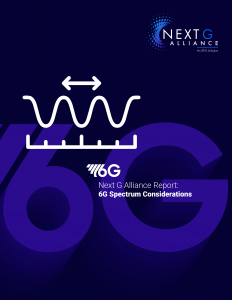 ATIS’ Next G Alliance (NGA) today announced release of the 6G Spectrum Considerations white paper, which provides a detailed assessment of North American spectrum bands and their future readiness for 6G deployment. Bandwidth and spectrum allocation issues are also covered.
ATIS’ Next G Alliance (NGA) today announced release of the 6G Spectrum Considerations white paper, which provides a detailed assessment of North American spectrum bands and their future readiness for 6G deployment. Bandwidth and spectrum allocation issues are also covered.
The paper overviews the current spectrum allocations for 3G/4G/5G in the United States, Canada and Mexico and is part of a much broader effort to better understand and influence spectrum access, management, policy recommendations, standards and long-term needs in 6G spectrum.
“U.S. leadership in critical and emerging technologies will depend on its global leadership in opening spectrum for 6G,” said Next G Alliance Managing Director Mike Nawrocki. “This paper lays the groundwork for this leadership by conveying critical industry insights into North American spectrum bands as they relate to the future needs of 6G innovation. As with previous generations of mobile technology, spectrum will be a true catalyst for establishing 6G market readiness. The issues covered in this report also offer an opportunity for industry engagement with policymakers and regulatory bodies such as the Federal Communications Commission and the National Telecommunications and Information Administration on how to address critical issues now to prepare for the 6G future.”
The Next G Alliance developed this paper as the first comprehensive survey of spectrum bands that have the potential to support 6G in North America. As such, it serves as an important foundational document in the process of identifying the most promising bands for further research and study. It also provides a basis for early engagement on the challenges associated with potential bands and opportunities for mitigating potential interference with incumbent users.
“Spectrum is the lifeblood for all commercial mobile broadband systems,” said Andrew Thiessen (MITRE), Chair, ATIS’ Next G Alliance Spectrum Working Group. “We have seen consistent evolution in the use of these systems from one generation to the next, along with an ever-increasing demand for spectrum to satisfy the needs of each system. As such, serious and diligent study of spectrum that could be made available/accessible to future systems is critical. This paper is a comprehensive first step in meeting the needs of next generation commercial mobile broadband.”
“Enabling spectrum for 6G can be a long process,” said Fabiano Chaves, Head of Spectrum Standardization North America at Nokia and Vice-Chair of Spectrum Working Group. “This paper provides valuable and timely input from the industry and academia to this process, with a detailed assessment of spectrum opportunities and challenges, which will contribute to well-informed decisions about 6G spectrum in North America.”
Issues covered in this report are evolving and a companion paper to 6G Spectrum Considerations is planned to follow. It will delve into the 6G spectrum needs considering frequency-dependent characteristics and target key performance indicators (KPIs) from a spectrum perspective for enabling technologies’ and applications’ performance requirements. Both 6G Spectrum Considerations and the forthcoming paper are considered a starting point for a global consensus process to establish spectrum for 6G.
Access 6G Spectrum Considerations and all Next G Alliance publications in the 6G Library.
